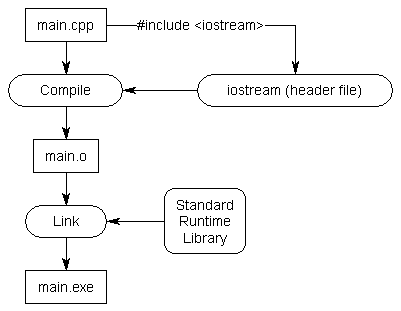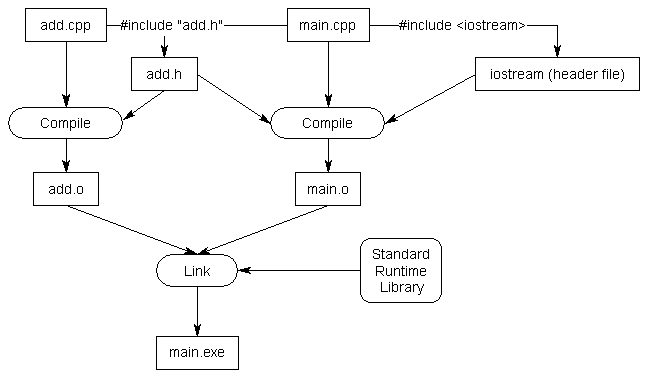Purpose?
- To hold declarations for other files to use.
- Typically only contain declarations, do not define how something is implemented.
Standard library header files
- Standard libary function is implemented in the C++ runtime support library, which is automatically linked into the program during the link phase.

Use header file instead of forward declaration
- We need a forward declaration so that the compiler would know about the function (even it is implemented in the another file) when compiling.
- However, writing forward declarations for every function that lives in another file can is tedious.
- A header file only has to be written once, and it can be included in as many files as needed.
Header guard
- Header guards prevent a given header file from being included more than once in the same file.
#ifndef ADD_H // can be any unique name
#define ADD_H
int add(int x, int y);
#endif
How Compiler work with header files?
When the compiler compiles the #include "some_header.h", It simply copies the contents of some_header.h into the current file at that point. Consequently, program will compile and link correctly.

<header.h> vs "header.h"
-
Angled brackets(
<>): compiler looks for the header in the system directories. -
Double-quotes(
""): compiler looks for the header file in the current directory containing the source code. If not found, it will check any other include paths specified in compiler/IDE settings. That failing, it will fall back to checking the system directories.
Best practices
-
Always include header guards.
-
Do not define variables in header files unless they are constants. Header files should generally only be used for declarations.
-
Do not define functions in header files.
-
Each header file should have a specific job, and be as independent as possible. For example, you might put all your declarations related to functionality A in A.h and all your declarations related to functionality B in B.h. That way if you only care about A later, you can just include A.h and not get any of the stuff related to B.
-
Give your header files the same name as the source files they’re associated with (e.g. grades.h goes with grades.cpp).
-
Try to minimize the number of other header files you include in your header files. Only include what is necessary. Do not include .cpp files.
See also
Referred from: https://www.learncpp.com/cpp-tutorial/19-header-files/